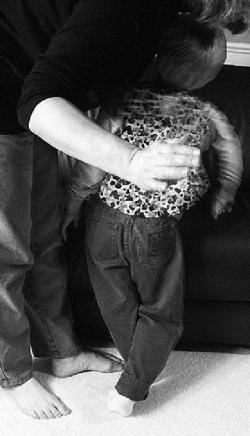
CREDIT: Wayne Cuddington, CanWest News Service

CREDIT: Wayne Cuddington, CanWest News Service |
The Criminal Code allows parents and educators to resort to corporal punishment as a corrective measure.OTTAWA - Parents who routinely spank their children could soon be slapped with charges of assault under legislation to be unveiled today.
The bill, to be tabled in the Senate by Liberal Senator Céline Hervieux-Payette, would remove the defence currently contained in Section 43 of the Criminal Code for parents and educators who resort to corporal punishment as a corrective measure. Without that defence, they could be open to charges of assault for striking children in their care -- particularly if it occurs often or is severe.
"It's not a means of education, it is a means of coercion that in certain cases causes irreparable damage that we can't tolerate in an evolved society that cares about the welfare of children," Ms. Hervieux-Payette said.
Ms. Hervieux-Payette -- who oversaw an overhaul of the Youth Offenders Act to put more emphasis on rehabilitation when she was a federal Cabinet minister in the 1980s -- admits she is not the first parliamentarian to tackle the controversial question. There have been six private members' bills tabled by MPs and one by a senator.
However, Ms. Hervieux-Payette is convinced she will succeed where others have failed -- in large part because Prime Minister Paul Martin's government has a minority.
"In a period of minority government you are less at the mercy of the government and more capable of going to all the political parties to get support because there is more power in the hands of parliamentarians in a minority government."
Read Senator Hervieux-Payette's Bill S-21 The European Union has also recently adopted legislation protecting children from corporal punishment, she added.
While Ms. Hervieux-Payette, a mother of three and grandmother of six, has had a long interest in children's rights, she said it was January's Supreme Court ruling on spanking that sparked her resolve to tackle the issue in Parliament.
In a split decision, Canada's top court voted 6-3 to uphold the rights of parents to use "reasonable" force to spank their children and outlined guidelines for its use. In the dissenting opinion, however, Justices Louise Arbour and Marie Deschamps said the current law was vague and should be rewritten by Parliament.
In her dissent, Justice Deschamps also said the law infringes on a child's right to equality and to the equal protection of the law.
It "perpetuates the notion of children as property rather than human beings and sends the message that their bodily integrity and physical security is to be sacrificed to the will of their parents, however misguided," wrote Judge Deschamps, who babysat Ms. Hervieux-Payette's children in her youth.
"That judgment shocked me," Ms. Hervieux-Payette recounted. "Obviously, I took the Supreme Court's message that if politicians aren't happy they just have to change the law."
But while Ms. Hervieux-Payette's bill could open parents to prosecution for assault, she dismissed suggestions it could result in parents being hauled into court on criminal charges for an occasional slap, saying prosecutors would use their judgment and wouldn't lay charges in minor cases.
Ms. Hervieux-Payette said her bill already has the support of dozens of groups who work with children such as medical professionals. It also has the support of MPs such as Liberal Francoise Boivin who has agreed to lobby for the bill when it reaches the House of Commons.
"Society has changed a lot through the years," said Ms. Boivin, pointing out that Quebec school boards prohibit teachers from using corporal punishment.
A spokesman said Justice Minister Irwin Cotler wants to read the bill before deciding whether to support it.
© National Post 2004
|
HAVE YOU BEEN TO THE NEWSROOM? CLICK HERE! |